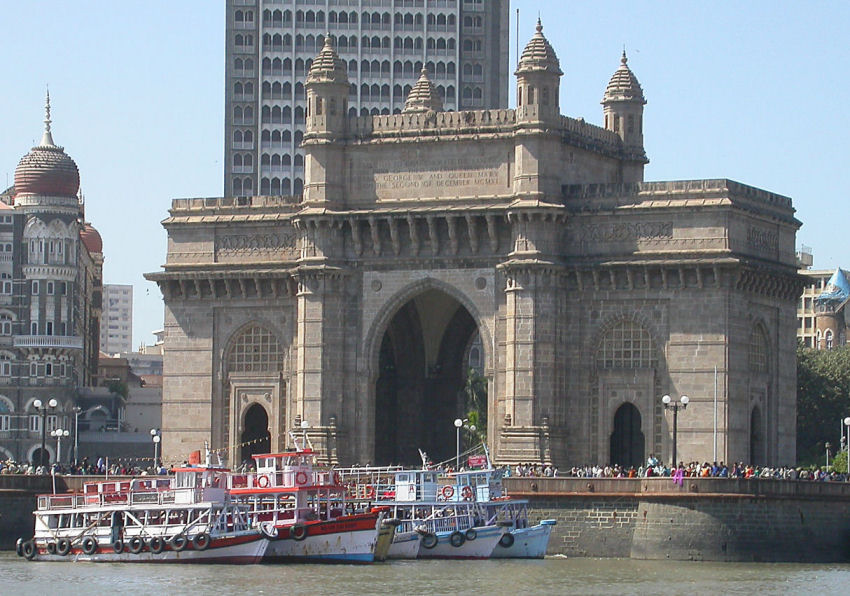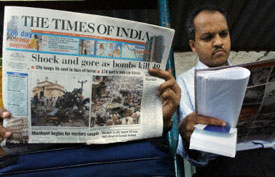TERRORISM IN MUMBAI (BOMBAY)
In the wake of the horrifying news and images on TV about the tragedy of terrorism in Mumbai, these two articles have been circulating on e-mail to ex-Bombay wallahs, and expatriate Indians all over the world. The author of the letter is unknown.

I AM PROUD TO BE MUMBAIKAR...
Dear Terrorist,
Even if you are not reading this we don't care. Time and again you tried to disturb us and disrupt our life - killing innocent civilians by planting bombs in trains, buses and cars. You have tried hard to bring death and destruction, cause panic and fear and create communal disharmony but every time you were disgustingly unsuccessful. Do you know how we pass our life in Mumbai? How much it takes for us to earn that single rupee? If you wanted to give us a shock then we are sorry to say that you failed miserably in your ulterior motives. Better look elsewhere, not here.
We are not Hindus and Muslims or Gujaratis and Marathis or Punjabis and Bengalis. Nor do we distinguish ourselves as owners or workers, govt. employees or private employees. WE ARE MUMBAIKERS (Bombay-ites, if you like). We will not allow you to disrupt our life like this. On the last few occasions when you struck (including the 7 deadly blasts in a single day killing over 250 people and injuring 500+ in 1993), we went to work next day in full strength. This time we cleared everything within a few hours and were back to normal - the vendors placing their next order, businessmen finalizing the next deals and the office workers rushing to catch the next train. (Yes the same train you targeted).
Fathom this: Within 3 hours of the blasts, long queues of blood donating volunteers were seen outside various hospital, where most of the injured were admitted. By 12 midnight, the hospital had to issue a notification that blood banks were full and they didn't require any more blood. The next day, attendance at schools and office was close to 100%, trains & buses were packed to the brim, the crowds were back. The city has simply dusted itself off and moved one - perhaps with greater vigour.
We are Mumbaikers and we live like brothers in times like this. So, do
not dare to threaten us with your crackers. The spirit of Mumbai is very
strong and cannot be harmed.
Please forward this to others. You never know, by chance it may come
to hands of a terrorist in Afghanistan, Pakistan or Iraq and he can then read
this message which is specially meant for him!!!
With Love,
From the people of Mumbai
(Bombay)
_____________________________________

INDIA’S INDESTRUCTIBLE HEART
By Naresh Fernandes
From The New York Times - July 12th 2006
Mumbai, India: My
Tuesday morning began with a flashback
of the tragedy that "buried Lower Manhattan
in a cloud of toxic dust that for a moment
blotted out the sun." That's how a former
colleague of mine from The Wall Street
Journal had ended the first chapter of
her memoir about her experiences on 9/11, which
she had just e-mailed me from New York.
Twelve hours later, Indian news channels reported an explosion on a rush-hour
train just past Bandra, the suburban stop where I'd gotten off an hour before.
Our commuter rail's western line carries three million of us back from work
every evening, so almost everybody I know was a potential victim. Just as I
was absorbing the enormity of the blast, there was news of another and then
some more. As the evening wore on, we learned that there'd been eight blasts,
all timed within a few minutes.
Many of us had seen this before. On March 12, 1993, at least 10 bombs shattered the spine of our city, then called Bombay, in two hours, tearing their way northward in short, deadly bursts. That attack left 257 dead. Since then, the city has been the target of several other vicious bombings, most recently in 2003, when car bombs went off at the city's most recognizable symbol, the Gateway of India.
The last few years have been difficult for overcrowded Mumbai, but this fortnight has left nerves especially taut. Moderate monsoon rains caused such enormous flooding that the whole city was shut down for three days. Those floods evoked memories of the cloudburst last July 26, when more than 400 people were drowned, electrocuted and crushed after their homes collapsed on top of them.
It was a tragedy that brought into focus how years of wilful neglect and breathtaking corruption by municipal officials, working in tandem with avaricious politicians and real estate developers, have brought India's financial capital to its knees. After "26/7," as the press immediately labelled the day, our politicians and administrators fell over themselves to assure us that they'd set things right. Last week's rains showed that their promises were as empty as our drains were full of rubbish.
Then, when the rain stopped last week, we found hooligans rampaging through our streets. As we settled down to brunch on Sunday, our TV sets brought us the chilling sight of buses being ransacked and burnt across Mumbai by cadres of the Hindu nativist Shiv Sena party. They claimed that a statue of their leader's late wife had been vandalized, and they were protesting in the only way they knew how.
Despite the long history of sporadic violence, Mumbai has always picked itself up by its bootstraps and marched off to work as soon as the trains started working again. Our ability to jeer at misfortune is attributed in the Indian press to the "spirit of Bombay," which is variously described as "indomitable," "never say die" and "undying." But our spirit has been saluted so frequently of late, all the praise was beginning to annoy me.
Before I left the office Tuesday evening, I finished a magazine article
complaining that this illogical faith in Bombay's innate resilience had the
unfortunate consequence of absolving the city's administrators of the responsibility
of actually fixing our problems. No matter how bad
things get, they seem to suggest, we have an infinite capacity to cope.
Soon after hearing about the blasts, I made my way to the local hospital to see if they needed blood donations. It had been less than an hour since the first explosion, but I'd been beaten to it by nearly 200 people.
When the volunteers found that the authorities had adequate supplies of blood, they waited patiently to help carry victims into the wards. Others stood over shocked survivors, fanning them with newspapers and helping them contact relatives.
Stories of exceptional selflessness have
flooded in all evening. One came from my friend Aarti, who was
in one of the trains on which a bomb went off. As she jumped out
of her compartment, she saw streams of slum dwellers from the bleak
shanties along the tracks rushing toward the train with bed sheets.
They knew that there would be no stretchers to be found and were
offering their threadbare cottons to be used as hammocks to carry
victims away.
Perhaps the newspapers have it right after all. An anguished night has
fallen over Mumbai, but when the city eventually sleeps it will do so secure
in the knowledge that its spirit is unbroken, that it is, exactly like the
myth has it, indomitable and undying.
Naresh Fernandes is the editor of Time Out Mumbai